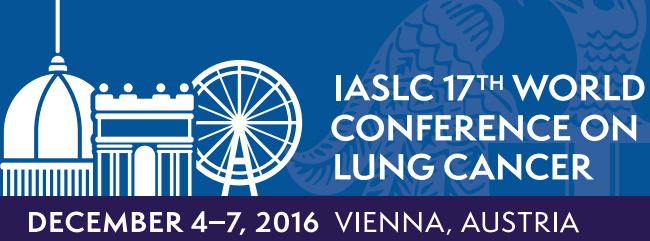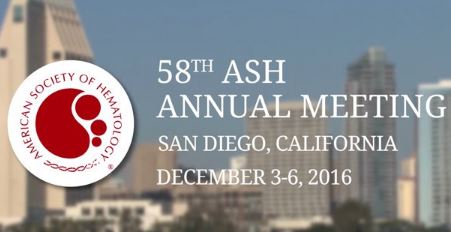ASH 2016 Highlights, December 3-6 2016
AbbVie Inc. & Janssen – Ibrutinib (IMBRUVICA®). PCYC-1121-CA Phase II trial assessed ibrutinib as a single-agent treatment for marginal zone lymphoma patients that received one or more prior therapies including at least one CD20-directed regimen. In the study, 79% of patients experienced some tumor reduction (50 out of 63 patients) and ORR was 48%. Abbvie based a new sNDA submission on this study in September 2016. More here
AbbVie Inc. & Janssen – Ibrutinib (IMBRUVICA®). In a Phase II Study of Ibrutinib in Chronic Graft Versus Host Disease after Failure of Corticosteroids with a median follow-up of 14 months in 42 patients, an ORR of 67% was found. 1/3 of the patients had a CR, with 71% of responders having a sustained response of at least 5 months. The results of this trial lead to breakthrough designation for this indication and plans for a pivotal trial. More here
Alexion Pharmaceuticals, Inc.- ALXN1210. In an interim analysis (N=13 patients) of a Phase 1/2 dose-escalation study of ALXN1210 in patients with paroxysmal nocturnal hemoglobinuria, ALXN1210 resulted in rapid, complete, and sustained C5 inhibition. LDH levels were rapidly reduced in all patients. FACIT-Fatigue scores improved in both cohorts, but improvement in patients was 2.1-fold greater in the higher dose cohort (1800 mg), consistent with better hemolytic response. More here
Celgene Corporation – Lenalidomide (Revlimid®). The German CLL M1 study shows that maintenance therapy with lenalidomide after front-line chemoimmunotherapy substantially prolongs PFS in patients with high-risk CLL. 60 received lenalidomide and 29 placebo. After a median observation time of 17.7 months, the HR for PFS was 0.198 (95% CI 0.083 to 0.475, stratified by MRD level at randomization). The median PFS in the placebo arm was 14.6 months, and was not reached in the lenalidomide arm. The study was stopped early because of the positive results at interim analysis. More here
Kite pharma – Axicabtagene Ciloleucel (KTE-C19 – anti-CD19 CAR T Cells). ZUMA-1 trial enrolled 111 patients (101 pts received KTE-C19) with chemorefractory aggressive NHL. With an ORR of 76%, the study met the primary endpoint with 47% CRs and 29% PRs. 92% of responses occurred within the 1st month, and 39% of patients had ongoing responses (CR in 33%) at 3 months. Responses were seen across key covariates, including refractory subgroup (refractory to chemotherapy=76%, relapse post ASCT=80%). Kaplan-Meier estimates of progression-free survival at 1 and 3 months were 92% and 56%, respectively. More here
Novartis AG – CTL019 (anti-CD19 CAR-T cell). The global Phase II registration trial of CTL019 in pediatric and young adult patients with r/r B-cell acute lymphoblastic leukemia found that 82% (41 of 50) of patients achieved complete remission or complete remission with incomplete blood count recovery in interim analysis. In addition to filing CTL019 for approval with the FDA in early 2017, Novartis plans to file with the EMA later in 2017. CTL019 received PRIME (PRIority MEdicines) designation from the EMA earlier this year. More here
Novartis AG – Crizanlizumab (SelG101). The novel agent for sickle cell disease shows in a randomized, placebo-controlled, double-blind, 12-month phase III SUSTAIN study that it reduced annual rate of sickle cell-related pain crises by 45.3% compared to placebo (1.63 vs 2.98, p=0.010). The trial randomized 198 patients age 16 to 65 to receive crizanlizumab high dose, low dose or placebo. More here
Pfizer Inc. – Glasdegib (PF-04449913). New Phase II trial results show that the addition of glasdegib to low-dose cytarabine (LDAC) significantly increased overall survival (OS) when compared to LDAC alone in patients with acute myeloid leukemia (AML) or high-risk myelodysplastic syndrome (MDS) who were ineligible for intensive chemotherapy (HR: 0.501, 80% CI: 0.384, 0.654, one-sided log rank p-value 0.0003). At the time of data cut-off, median OS for patients taking glasdegib plus LDAC (n=88) was 8.8 months (80% CI: 6.9, 9.9) compared to 4.9 months (80% CI: 3.5, 6.0) for patients taking LDAC only (n=44). More here
Roche – Obinutuzumab (Gazyva®/Gazyvaro®). In a global Phase III open-label, multi-centre, randomised 2-arm study examining obinutuzumab plus chemotherapy followed by obinutuzumab alone for up to 2 years, as compared to rituximab plus chemotherapy followed by rituximab alone for up to 2 years, 1401 patients with previously untreated indolent NHL, of which 1202 patients had follicular lymphoma (FL) were included. The results showed obinutuzumab-based treatment reduced the risk of PFS by 34% compared to rituximab-based treatment (HR=0.66; 95% CI 0.51-0.85, p=0.0012). Median PFS was not yet reached. The results could support obinutuzumab with chemotherapy becoming a new standard of care in previously untreated FL. However, there was no difference in OS and there was an increase in side-effects seen with obinutuzumab when compared to rituximab. More here
Seattle Genetics, Inc. – Brentuximab ventolin (Adcetris®). The ALCANZA phase III study (128 patients in the intent-to-treat population) shows that Adcetris had significantly superior clinical outcomes when compared with physician’s choice (methotrexate or bexarotene) in CD30-expressing cutaneous T cell lymphoma. The ORR4 was 56.3% in the Adcetris arm compared to 12.5% in the control arm (p-value <0.0001). The median PFS in the Adcetris arm was 16.7 months compared to 3.5 months (HR 0.270; 95% CI, 0.169, 0.430; p-value <0.0001). More here
San Antonio Breast Cancer Symposium Highlights, December 6-10 2016
Novartis – Everolimus (Afinitor®). Post-menopausal women with HR-positive, HER2-negative metastatic breast cancer receiving the mTOR inhibitor everolimus + fulvestrant had a two-fold increase in PFS compared to women who did not receive the mTOR inhibitor. More here
Roche – Pertuzumab (Perjeta®). The phase II PERTAIN trial shows that adding pertuzumab to trastuzumab, and an aromatase inhibitor in HER2-positive, hormone receptor-positive metastatic or locally advanced breast cancer delayed progression by about 3 months. Hyman Muss, MD called the results “not ready for primetime,” but promising. More here
Paxman – Orbis Paxman Hair Loss Prevention System. Scalp-cooling device safe and effective in reducing chemotherapy-induced alopecia in women with Breast Cancer. An interim analysis of 95 patients receiving at least 4 cycles of neoadjuvant or adjuvant anthracycline- or taxane-based chemotherapy revealed that more than 50% (48/95) of women in the cooling group had hair preservation compared to 0% (0/47) in the non-cooling group. More here
IASLC 17th World Conference on Lung Cancer Highlights, December 4-7 2016
AstraZeneca – Osimertinib (Tagrisso®). Results from the international AURA3 confirmatory phase III trial, conducted to investigate the superiority of osimertinib over platinum therapy plus pemetrexed, showed that osimertinib offered a PFS improvement vs standard platinum-based doublet chemotherapy (10.1 vs 4.4 months, HR 0.30; 95% CI:0.23, 0.41; p<0.001) in patients with T790M-positive advanced NSCLC (including those with CNS metastases). More here
MSD – Pembrolizumab (KEYTRUDA®). Patients receiving pembrolizumab in the KEYNOTE-024 trial report better quality of life than those on chemotherapy. Previous data from KEYNOTE-024 demonstrated a superior PFS and OS in pembro arm as first-line therapy for patients with advanced NSCLC with PD-L1 expression on greater than 50% of tumor cells and no sensitizing EGFR or ALK aberrations. More here
Novartis – Ceritinib (Zykadia®). Results from ASCEND-4 trial show patients receiving 1st-line ceritinib experienced a 45% risk reduction for disease progression advanced ALK+ NSCLC compared to standard 1st-line chemotherapy. Ceritinib had a median PFS of 16.6 months, compared with 8.1 months for chemotherapy with maintenance. Patients without brain metastases at diagnosis experienced median PFS of 26.3 months (the longest seen in a global Phase III study in ALK+ NSCLC). More here
 More about: Icotinib in NSCLC with brain metastases click here, Atezolizumab in NSCLC here, Durvalumab in heavily-pretreated metastatic patients with NSCLC here, Nivolumab in malignant pleural mesothelioma here, Brigatinib in ALK+ NSCLC treated with prior crizotinib therapy here.
More about: Icotinib in NSCLC with brain metastases click here, Atezolizumab in NSCLC here, Durvalumab in heavily-pretreated metastatic patients with NSCLC here, Nivolumab in malignant pleural mesothelioma here, Brigatinib in ALK+ NSCLC treated with prior crizotinib therapy here.


